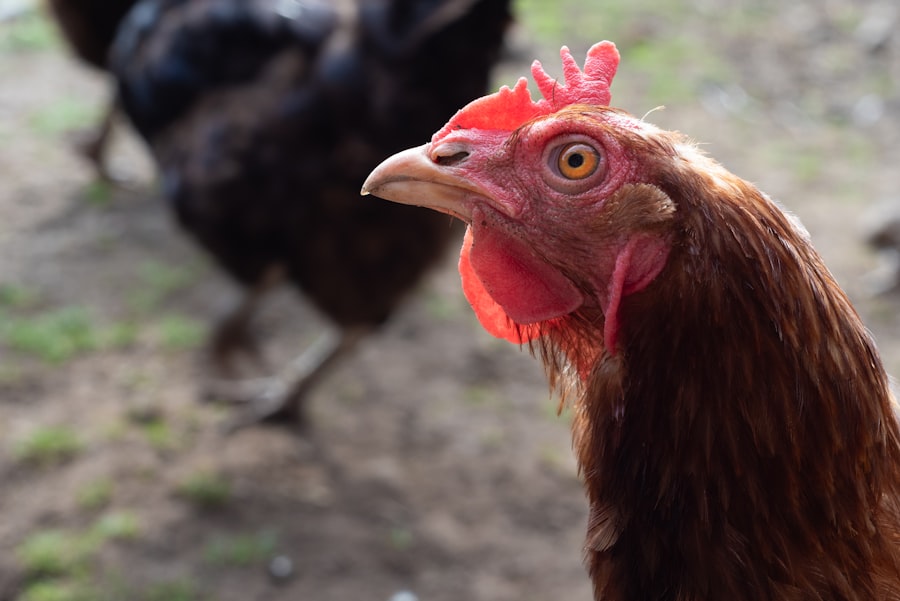Chicken-keeping has a long history in the United Kingdom, dating back to the domestication of chickens thousands of years ago. However, in recent years, there has been a significant rise in the popularity of urban chicken-keeping. More and more people are choosing to keep chickens in their back gardens, enjoying the benefits that come with it.
Traditionally, chicken-keeping was more common in rural areas, where people had larger plots of land and more space for livestock. However, with the rise of urbanization and the increasing interest in sustainable living, many city dwellers are now embracing the idea of keeping chickens in their back gardens.
There are several reasons why urban chicken-keeping has become so popular. Firstly, it allows people to have a direct source of fresh eggs, which can be a healthier and more sustainable option compared to store-bought eggs. Additionally, chickens can help reduce food waste by eating kitchen scraps and providing natural pest control in the garden. They also make great pets and can be a source of entertainment and companionship.
Key Takeaways
- Urban chicken-keeping is becoming increasingly popular in the UK.
- Before keeping chickens in your back garden, it’s important to understand the legal considerations.
- When selecting chickens for your back garden, consider factors such as breed, temperament, and egg-laying ability.
- Creating a safe and comfortable coop is essential for the health and well-being of your chickens.
- Understanding the dietary needs of your chickens is crucial for their overall health and egg production.
Legal Considerations: What You Need to Know Before Keeping Chickens in Your Back Garden
Before embarking on your chicken-keeping journey, it is important to familiarize yourself with the local laws and regulations regarding backyard chickens. Different areas may have specific rules and restrictions when it comes to keeping poultry.
Some local authorities require permits or licenses for keeping chickens, while others may have limits on the number of chickens allowed per household. It is important to check with your local council or animal control department to ensure that you are complying with all regulations.
In addition to permits and licenses, there may also be noise and odor ordinances that you need to be aware of. Chickens can be noisy at times, especially when they are laying eggs or feeling threatened. It is important to consider your neighbors and take steps to minimize noise levels, such as providing a quiet and secure coop.
Odor can also be a concern, especially if the coop is not properly maintained. Regular cleaning and proper waste management can help reduce odors and keep your neighbors happy.
Choosing the Right Breed: Factors to Consider When Selecting Chickens for Your Back Garden
When it comes to choosing chickens for your back garden, there are several factors to consider. Firstly, you need to decide whether you want chickens primarily for egg-laying or for meat production. There are specific breeds that are known for their egg-laying abilities, while others are bred for their meat.
If you are primarily interested in egg production, breeds such as the Rhode Island Red, Sussex, or Leghorn are good options. These breeds are known for their high egg production and can provide you with a steady supply of fresh eggs.
On the other hand, if you are interested in raising chickens for meat, breeds such as the Cornish Cross or the Plymouth Rock are popular choices. These breeds grow quickly and have good meat quality.
Another factor to consider when choosing chickens is temperament and personality. Some breeds are known to be more docile and friendly, while others can be more skittish or aggressive. It is important to choose a breed that suits your lifestyle and preferences.
Lastly, climate adaptability is an important consideration. Some chicken breeds are better suited to colder climates, while others thrive in warmer temperatures. It is important to choose a breed that can withstand the climate conditions in your area.
Housing and Coop Design: Creating a Safe and Comfortable Home for Your Chickens
Creating a safe and comfortable home for your chickens is essential for their well-being. The size and design of the coop will depend on the number of chickens you plan to keep.
A general rule of thumb is to provide at least 4 square feet of space per chicken inside the coop, and at least 10 square feet of outdoor space per chicken in the run. This will ensure that the chickens have enough room to move around and engage in natural behaviors.
The coop should also have nesting boxes for the chickens to lay their eggs, as well as roosting bars for them to perch on at night. The nesting boxes should be filled with clean bedding material, such as straw or wood shavings, to provide a comfortable and clean environment for egg-laying.
Proper ventilation is also important to prevent the buildup of moisture and ammonia inside the coop. This can be achieved by installing windows or vents that can be opened and closed as needed. Good lighting is also important to provide a natural day-night cycle for the chickens.
Feeding and Nutrition: Understanding the Dietary Needs of Your Backyard Chickens
Providing a balanced diet is crucial for the health and productivity of your backyard chickens. There are several types of feed available on the market, including pellets, crumbles, and mash. These feeds are formulated to provide all the necessary nutrients that chickens need to thrive.
In addition to commercial feed, chickens also require access to fresh water at all times. It is important to provide clean water in a container that is large enough for all the chickens to drink from.
While commercial feed is the main source of nutrition for chickens, they can also benefit from occasional treats and snacks. These can include kitchen scraps such as fruits, vegetables, and grains. However, it is important to avoid feeding them anything that is toxic or harmful to their health.
Health and Hygiene: Maintaining Good Health and Hygiene Practices for Your Flock

Maintaining good health and hygiene practices is essential for keeping your flock healthy and disease-free. Chickens are susceptible to a variety of health issues and diseases, so it is important to be proactive in preventing and treating these conditions.
Common health issues in chickens include respiratory infections, parasites, and nutritional deficiencies. Regular health checks and vaccinations can help prevent these issues. It is also important to provide a clean and dry environment for the chickens, as damp conditions can lead to the growth of bacteria and fungi.
Cleaning and disinfecting the coop on a regular basis is also important for maintaining good hygiene. This includes removing soiled bedding, cleaning the nesting boxes, and disinfecting surfaces with a poultry-safe disinfectant.
Egg Production: Maximizing Egg Yields and Quality from Your Backyard Chickens
Maximizing egg production and quality is a goal for many backyard chicken keepers. Understanding the egg-laying cycles and patterns of your chickens can help you achieve this.
Chickens typically start laying eggs at around 5-6 months of age, although this can vary depending on the breed. They will continue to lay eggs for several years, with peak production occurring in the first year.
Collecting eggs regularly is important to prevent them from becoming dirty or damaged. It is also important to store eggs properly to maintain their freshness and quality. Eggs should be stored in a cool and dry place, away from strong odors.
The quality of the eggs can be influenced by factors such as diet, stress levels, and overall health of the chickens. Providing a balanced diet, reducing stressors in the environment, and maintaining good health practices can help ensure that your chickens produce high-quality eggs.
Managing Noise and Odor: Tips for Keeping Your Neighbors Happy
One of the concerns that people may have when it comes to keeping chickens in their back gardens is noise and odor. However, with proper management, these concerns can be minimized.
To reduce noise levels, it is important to choose chicken breeds that are known for being quieter. Some breeds are naturally more vocal than others, so selecting quieter breeds can help keep noise levels down.
Minimizing odors can be achieved through proper waste management. Regularly cleaning the coop and removing soiled bedding can help reduce odors. Composting chicken manure can also help reduce odor and provide a valuable source of fertilizer for your garden.
Communicating with your neighbors is also important. Letting them know about your plans to keep chickens and addressing any concerns they may have can help maintain good relationships.
Winter Care: Preparing Your Chickens for Cold Weather and Shorter Days
Winter care is an important aspect of keeping chickens, especially in the UK where temperatures can drop significantly. Taking steps to prepare your chickens for cold weather and shorter days can help ensure their well-being.
Winterizing the coop is essential to protect the chickens from the cold. This can be done by insulating the coop, sealing any drafts, and providing extra bedding for warmth. It is also important to ensure that the coop is well-ventilated to prevent the buildup of moisture.
Providing warmth and light is also important during the winter months. This can be achieved by using heat lamps or heated pads in the coop. It is important to monitor the temperature to ensure that it does not get too hot or too cold.
Adjusting feeding and watering schedules is also necessary during the winter months. Chickens require more energy to stay warm, so providing them with a higher calorie feed can help meet their nutritional needs. It is also important to ensure that their water does not freeze, as chickens require access to fresh water at all times.
The Joys and Benefits of Keeping Chickens in Your Back Garden in the UK
Keeping chickens in your back garden can be a rewarding and enjoyable experience. Not only do they provide a direct source of fresh eggs, but they also offer companionship and entertainment.
The benefits of chicken-keeping extend beyond just eggs. Chickens can help reduce food waste by eating kitchen scraps, provide natural pest control in the garden, and contribute to a more sustainable lifestyle.
While there are legal considerations and responsibilities that come with keeping chickens, with proper planning and management, these can be easily addressed. By choosing the right breed, providing a safe and comfortable home, and maintaining good health and hygiene practices, you can ensure the well-being of your flock.
If you are considering keeping chickens in your back garden, it is important to do your research and gather all the necessary information. There are many resources available online and through local poultry clubs that can provide guidance and support.
In conclusion, keeping chickens in your back garden can be a fulfilling and rewarding experience. It allows you to connect with nature, provide for yourself and your family, and contribute to a more sustainable way of living. So why not give it a try? You may just discover a new passion and a flock of feathered friends that bring joy to your life.
If you’re considering keeping chickens in your back garden in the UK, you may also be interested in learning about the mating season for ducks. Poultry Wizard has a helpful article on “When is Duck Mating Season?” that provides valuable information on the breeding habits and behaviors of ducks. Understanding the mating season can be beneficial if you plan to keep ducks alongside your chickens. To further enhance your chicken-keeping experience, Poultry Wizard also offers insights into creative chicken coop interior ideas and tips on determining the ideal chicken coop door size. These articles provide practical advice and inspiration for creating a comfortable and functional space for your feathered friends.
FAQs
What are the rules and regulations for keeping chickens in your back garden in the UK?
In the UK, there are rules and regulations that govern the keeping of chickens in your back garden. These rules are designed to ensure that the welfare of the chickens is protected, and that they do not cause a nuisance to your neighbours. You should check with your local council to find out what the rules are in your area.
How many chickens can you keep in your back garden in the UK?
The number of chickens you can keep in your back garden in the UK will depend on the size of your garden and the rules and regulations in your area. Generally, you can keep up to six chickens without needing planning permission, but this can vary depending on where you live.
What kind of housing do you need for chickens in your back garden in the UK?
If you are keeping chickens in your back garden in the UK, you will need to provide them with suitable housing. This should be a secure and weatherproof coop that is large enough for your chickens to move around in comfortably. You should also provide them with a nesting box and perches.
What do you need to feed chickens in your back garden in the UK?
Chickens in your back garden in the UK will need a balanced diet that includes a mixture of grains, vegetables, and protein. You can buy specialist chicken feed from pet shops and online retailers, or you can make your own feed using a mixture of grains and vegetables.
What are the benefits of keeping chickens in your back garden in the UK?
Keeping chickens in your back garden in the UK can have a number of benefits. They can provide you with fresh eggs, help to control pests in your garden, and make great pets. They are also relatively low maintenance and can be a fun and educational hobby for children.
Meet Walter, the feathered-friend fanatic of Florida! Nestled in the sunshine state, Walter struts through life with his feathered companions, clucking his way to happiness. With a coop that’s fancier than a five-star hotel, he’s the Don Juan of the chicken world. When he’s not teaching his hens to do the cha-cha, you’ll find him in a heated debate with his prized rooster, Sir Clucks-a-Lot. Walter’s poultry passion is no yolk; he’s the sunny-side-up guy you never knew you needed in your flock of friends!







